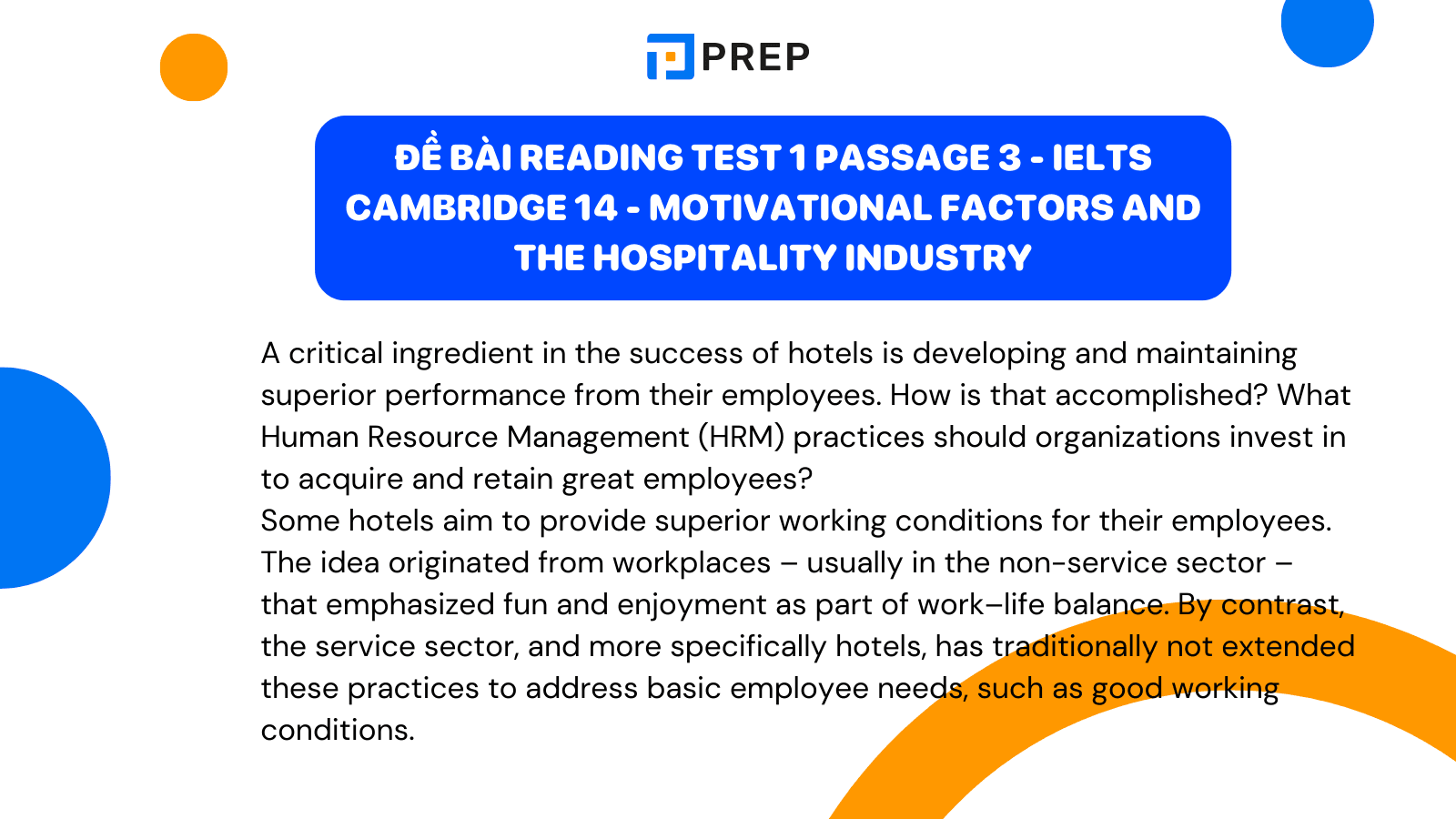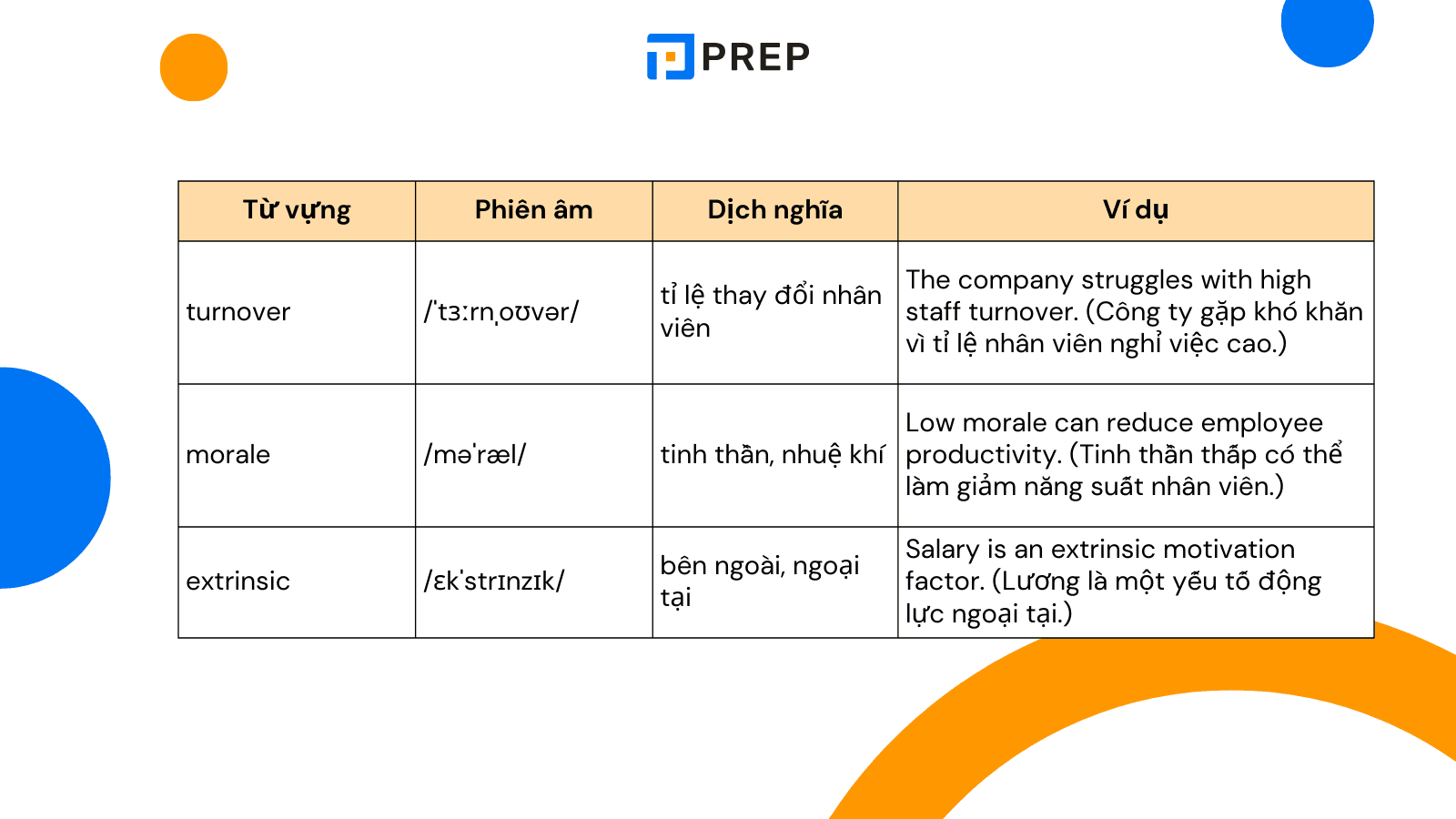Đề bài và đáp án bài Reading Test 1 passage 3 - IELTS Cambridge 14 - Motivational factors and the hospitality industry
Trong IELTS Reading, bài đọc Motivational factors and the hospitality industry thuộc Cambridge 14 Test 1 Passage 3 là một văn bản học thuật phân tích các yếu tố tạo động lực cho nhân viên trong ngành dịch vụ khách sạn. Việc nắm vững đề bài và đáp án chi tiết không chỉ hỗ trợ làm đúng câu hỏi, mà còn giúp hiểu cách tác giả triển khai lập luận, từ đó nâng cao kỹ năng tìm ý chính, xác định thông tin cụ thể và xử lý dạng câu hỏi khó trong IELTS Reading.

I. Đề bài Reading Test 1 passage 3 - IELTS Cambridge 14 - Motivational factors and the hospitality industry
Motivational factors and the hospitality industry
A critical ingredient in the success of hotels is developing and maintaining superior performance from their employees. How is that accomplished? What Human Resource Management (HRM) practices should organizations invest in to acquire and retain great employees?
Some hotels aim to provide superior working conditions for their employees. The idea originated from workplaces – usually in the non-service sector – that emphasized fun and enjoyment as part of work–life balance. By contrast, the service sector, and more specifically hotels, has traditionally not extended these practices to address basic employee needs, such as good working conditions.
Pfeffer (1994) emphasizes that in order to succeed in a global business environment, organizations must make investment in Human Resource Management (HRM) to allow them to acquire employees who possess better skills and capabilities than their competitors. This investment will be to their competitive advantage. Despite this recognition of the importance of employee development, the hospitality industry has historically been dominated by underdeveloped HR practices (Lucas, 2002).
Lucas also points out that ‘the substance of HRM practices does not appear to be designed to foster constructive relations with employees or to represent a managerial approach that enables developing and drawing out the full potential of people, even though employees may be broadly satisfied with many aspects of their work’ (Lucas, 2002). In addition, or maybe as a result, high employee turnover has been a recurring problem throughout the hospitality industry. Among the many cited reasons are low compensation, inadequate benefits, poor working conditions and compromised employee morale and attitudes (Maroudas et al., 2008).
Ng and Sorensen (2008) demonstrated that when managers provide recognition to employees, motivate employees to work together, and remove obstacles preventing effective performance, employees feel more obligated to stay with the company. This was succinctly summarized by Michel et al. (2013): ‘[P]roviding support to employees gives them the confidence to perform their jobs better and the motivation to stay with the organization.’ Hospitality organizations can therefore enhance employee motivation and retention through the development and improvement of their working conditions. These conditions are inherently linked to the working environment.
While it seems likely that employees’ reactions to their job characteristics could be affected by a predisposition to view their work environment negatively, no evidence exists to support this hypothesis (Spector et al., 2000). However, given the opportunity, many people will find something to complain about in relation to their workplace (Poulston, 2009). There is a strong link between the perceptions of employees and particular factors of their work environment that are separate from the work itself, including company policies, salary and vacations.
Such conditions are particularly troubling for the luxury hotel market, where high-quality service, requiring a sophisticated approach to HRM, is recognized as a critical source of competitive advantage (Maroudas et al., 2008). In a real sense, the services of hotel employees represent their industry (Schneider and Bowen, 1993). This representation has commonly been limited to guest experiences. This suggests that there has been a dichotomy between the guest environment provided in luxury hotels and the working conditions of their employees.
It is therefore essential for hotel management to develop HRM practices that enable them to inspire and retain competent employees. This requires an understanding of what motivates employees at different levels of management and different stages of their careers (Enz and Sigauw, 2000). This implies that it is beneficial for hotel managers to understand what practices are most favorable to increase employee satisfaction and retention.
Herzberg (1966) proposes that people have two major types of needs, the first being extrinsic motivation factors relating to the context in which work is performed, rather than the work itself. These include working conditions and job security. When these factors are unfavorable, job dissatisfaction may result. Significantly, though, just fulfilling these needs does not result in satisfaction, but only in the reduction of dissatisfaction (Maroudas et al., 2008).
Employees also have intrinsic motivation needs or motivators, which include such factors as achievement and recognition. Unlike extrinsic factors, motivator factors may ideally result in job satisfaction (Maroudas et al., 2008). Herzberg’s (1966) theory discusses the need for a ‘balance’ of these two types of needs.
The impact of fun as a motivating factor at work has also been explored. For example, Tews, Michel and Stafford (2013) conducted a study focusing on staff from a chain of themed restaurants in the United States. It was found that fun activities had a favorable impact on performance and manager support for fun had a favorable impact in reducing turnover. Their findings support the view that fun may indeed have a beneficial effect, but the framing of that fun must be carefully aligned with both organizational goals and employee characteristics. ‘Managers must learn how to achieve the delicate balance of allowing employees the freedom to enjoy themselves at work while simultaneously maintaining high levels of performance’ (Tews et al., 2013).
Deery (2008) has recommended several actions that can be adopted at the organizational level to retain good staff as well as assist in balancing work and family life. Those particularly appropriate to the hospitality industry include allowing adequate breaks during the working day, staff functions that involve families, and providing health and well-being opportunities.
Questions 27-31
Look at the following statements (Questions 27-31) and the list of researchers below.
Match each statement with the correct researcher, A-F.
Write the correct letter, A-F, in boxes 27-31 on your answer sheet.
NB You may use any letter more than once.
-
Hotel managers need to know what would encourage good staff to remain. ...........................
-
The actions of managers may make staff feel they shouldn't move to a different employer. ...........................
-
Little is done in the hospitality industry to help workers improve their skills. ...........................
-
Staff are less likely to change jobs if cooperation is encouraged. ...........................
-
Dissatisfaction with pay is not the only reason why hospitality workers change jobs. ...........................
List of Researchers
A. Pfeffer
B. Lucas
C. Maroudas et al.
D. Ng and Sorensen
E. Enz and Sigauw
F. Deery
Questions 32-35
Do the following statements agree with the claims of the writer in Reading Passage 3?
In boxes 32-35 on your answer sheet, write
-
YES if the statement agrees with the claims of the writer
-
NO if the statement contradicts the claims of the writer
-
NOT GIVEN if it is impossible to say what the writer thinks about this
-
One reason for high staff turnover in the hospitality industry is poor morale. ...........................
-
Research has shown that staff have a tendency to dislike their workplace. ...........................
-
An improvement in working conditions and job security makes staff satisfied with their jobs. ...........................
-
Staff should be allowed to choose when they take breaks during the working day. ...........................
Questions 36-40
Complete the summary below.
Choose ONE WORD ONLY from the passage for each answer.
Write your answers in boxes 36-40 on your answer sheet.
Fun at work
Tews, Michel and Stafford carried out research on staff in an American chain of 36 ______________________. They discovered that activities designed for staff to have fun improved their 37 ______________________, and that management involvement led to lower staff 38 ______________________. They also found that the activities needed to fit with both the company's 39 ______________________ and the 40 ______________________ of the staff. A balance was required between a degree of freedom and maintaining work standards.

II. Đáp án đề Cambridge 14 test 1 reading passage 3
Reading Passage 3, Questions 27-40
-
E
-
D
-
B
-
D
-
C
-
YES
-
NO
-
NO
-
NOT GIVEN
-
restaurants
-
performance
-
turnover
-
goals
-
characteristics
III. Giải thích đáp án chi tiết motivational factors and the hospitality industry ielts reading answers
Questions 27–31 (Matching researchers)
-
27. E (Enz and Siguaw)
Đoạn 8: “This requires an understanding of what motivates employees at different levels…” → Quản lý cần biết điều gì khuyến khích nhân viên ở lại. -
28. D (Ng and Sorensen)
Đoạn 5: Nhấn mạnh rằng khi quản lý công nhận, khuyến khích hợp tác và gỡ bỏ trở ngại, nhân viên cảm thấy gắn bó và có trách nhiệm ở lại. -
29. B (Lucas)
Đoạn 4: “HRM practices… not designed to foster… developing full potential…” → HRM trong ngành còn yếu, chưa giúp phát triển kỹ năng. -
30. D (Ng and Sorensen)
Đoạn 5: Hợp tác được thúc đẩy → nhân viên ít rời bỏ. -
31. C (Maroudas et al.)
Đoạn 4: Ngoài lương thấp còn có nhiều lý do khác: phúc lợi, điều kiện làm việc, tinh thần.
Questions 32–35 (Yes/No/Not Given)
-
32. YES
Đoạn 4: Lý do nhân viên rời bỏ là “low compensation, inadequate benefits, poor working conditions and compromised morale.” → Poor morale là nguyên nhân. -
33. NO
Đoạn 6: “no evidence exists…” → Không có bằng chứng cho thấy nhân viên thường ghét nơi làm việc. -
34. NO
Đoạn 9: Extrinsic factors (điều kiện làm việc, an toàn) chỉ giúp giảm bất mãn, không mang lại hài lòng. -
35. NOT GIVEN
Đoạn 12 (Deery): đề xuất cho phép nghỉ ngơi hợp lý nhưng không nhắc việc nhân viên tự chọn thời gian nghỉ.
Questions 36–40 (Summary completion)
-
36. restaurants → nghiên cứu ở chuỗi nhà hàng Mỹ.
-
37. performance → hoạt động vui chơi cải thiện hiệu suất.
-
38. turnover → sự tham gia của quản lý làm giảm tỉ lệ thay đổi nhân viên.
-
39. goals → hoạt động vui chơi phải phù hợp mục tiêu công ty.
-
40. characteristics → và đặc điểm nhân viên.
IV. Từ vựng hay trong bài cần ghi nhớ
|
Từ vựng |
Phiên âm |
Dịch nghĩa |
Ví dụ |
|
turnover |
/ˈtɜːrnˌoʊvər/ |
tỉ lệ thay đổi nhân viên |
The company struggles with high staff turnover. (Công ty gặp khó khăn vì tỉ lệ nhân viên nghỉ việc cao.) |
|
morale |
/məˈræl/ |
tinh thần, nhuệ khí |
Low morale can reduce employee productivity. (Tinh thần thấp có thể làm giảm năng suất nhân viên.) |
|
extrinsic |
/ɛkˈstrɪnzɪk/ |
bên ngoài, ngoại tại |
Salary is an extrinsic motivation factor. (Lương là một yếu tố động lực ngoại tại.) |
|
intrinsic |
/ɪnˈtrɪnzɪk/ |
bên trong, nội tại |
Recognition is an intrinsic motivator. (Sự công nhận là một yếu tố động lực nội tại.) |
|
retention |
/rɪˈtɛnʃən/ |
sự giữ chân |
Good working conditions improve staff retention. (Điều kiện làm việc tốt giúp giữ chân nhân viên.) |
|
hospitality |
/ˌhɑːspɪˈtæləti/ |
ngành dịch vụ khách sạn |
Hospitality requires excellent customer service. (Ngành khách sạn đòi hỏi dịch vụ khách hàng xuất sắc.) |
|
recognition |
/ˌrɛkəɡˈnɪʃən/ |
sự công nhận |
Staff recognition motivates better performance. (Công nhận nhân viên thúc đẩy hiệu suất tốt hơn.) |
|
compensation |
/ˌkɒmpənˈseɪʃən/ |
tiền bồi thường/lương thưởng |
Low compensation causes dissatisfaction. (Mức lương thấp gây bất mãn.) |

Trên đây là đề bài và đáp án kèm giải thích đáp án chi tiết bài đọc Cambridge IELTS 14 motivational factors and the hospitality industry. Hy vọng tài liệu trên sẽ hữu ích cho bạn trong quá trình luyện thi IELTS đặc biệt là Reading.
Học tiếng Anh online dễ dàng hơn với PREP - Nền tảng Học & Luyện thi thông minh cùng AI. Nhờ công nghệ AI độc quyền, bạn có thể tự học trực tuyến ngay tại nhà, chinh phục lộ trình học IELTS, TOEIC, tiếng Anh giao tiếp hiệu quả. Bên cạnh đó, học viên còn có sự hỗ trợ tuyệt vời từ Teacher Bee AI, trợ lý ảo giúp bạn giải đáp thắc mắc và đồng hành 1-1 trong suốt quá trình học tập. Hãy click TẠI ĐÂY hoặc liên hệ HOTLINE 0931428899 để nhận tư vấn chi tiết về các khóa học tiếng Anh chất lượng nhất thị trường!
Tải ngay app PREP để bắt đầu hành trình học tiếng Anh tại nhà với chương trình học luyện thi online chất lượng cao.

Chào bạn! Mình là Hiền Hoàng, hiện đang đảm nhận vai trò quản trị nội dung sản phẩm tại Blog của website prepedu.com.
Với hơn 5 năm tự học các ngoại ngữ như tiếng Anh, tiếng Trung và ôn luyện một số kỳ thi IELTS, TOEIC, HSK, mình đã tự đúc rút được nhiều kinh nghiệm để hỗ trợ hàng nghìn người đang gặp khó khăn trong việc học ngoại ngữ. Hy vọng rằng những chia sẻ phía trên sẽ giúp ích cho bạn trong quá trình tự ôn luyện thi hiệu quả tại nhà!
Bình luận
Nội dung premium
Xem tất cảLộ trình cá nhân hoá
Có thể bạn quan tâm
Kết nối với Prep
MSDN: 0109817671.
Địa chỉ liên hệ: Tòa nhà Vinaconex, 34 Láng Hạ, phường Láng, TP Hà Nội.
Địa chỉ kinh doanh: Lô 21 C2 Khu đô thị Nam Trung Yên, phường Yên Hòa, TP Hà Nội.
Trụ sở: Số nhà 20, ngách 234/35 đường Hoàng Quốc Việt, phường Nghĩa Đô, TP Hà Nội.
Phòng luyện ảo - Trải nghiệm thực tế - Công nghệ hàng đầu.
Hotline: 0931 42 8899.
Trụ sở: Số nhà 20, ngách 234/35 đường Hoàng Quốc Việt, phường Nghĩa Đô, TP Hà Nội.
Giấy chứng nhận hoạt động đào tạo, bồi dưỡng số 1309/QĐ-SGDĐT ngày 31 tháng 07 năm 2023 do Sở Giáo dục và Đào tạo Hà Nội cấp.























